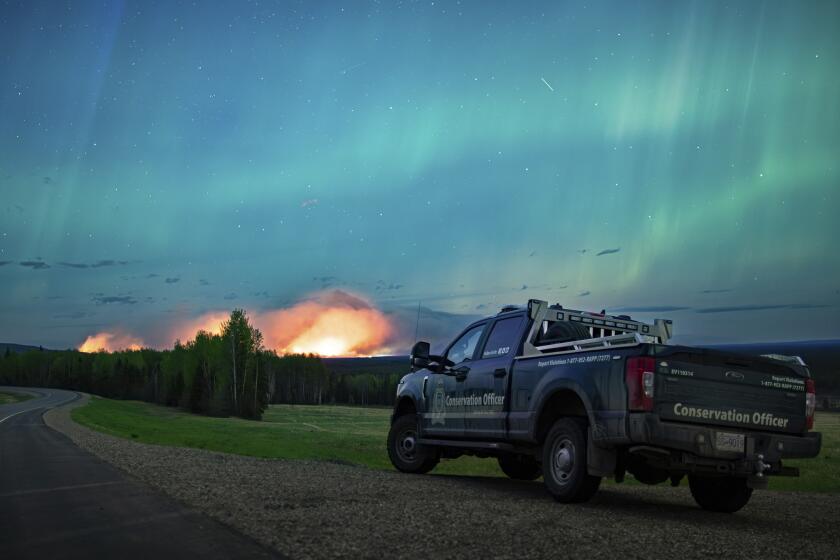Depending on the Kindness of Strangers : Economic allies abandon America
“I have always depended on the kindness of strangers,” said Blanche DuBois as they hauled her off to the asylum in “A Streetcar Named Desire.”
Blanche’s motto was America’s, too, during the last 12 years of idiotic misgovernance. Was the deficit out of control? Had the government thrown away trillions of taxpayer dollars on the bungled deregulation of the savings and loans and the banking system? Had our financial markets degenerated into rigged casinos as CEOs looted the companies they were supposed to build?
No matter, said America in the last 12 years. The kindness of strangers would bail us out. Yes, we had stopped saving for the future. Yes, we had saddled ourselves with incompetent managerial and government elites. Yes, we had allowed our educational and health-care systems to decay into vastly expensive and unproductive ruin.
But so what? America could always depend on the kindness of strangers. Foreign investors would buy up the bonds of our debauched Treasury. Foreign investors would snap up our overbuilt office parks. Foreign investors would buy the shares of our mismanaged companies and invest in the technology that, someday, might begin to allow us to repair the damage of our 12-year binge.
And they did, for a while. All during the ‘80s, foreigners bought our companies, our Treasury bills and our office buildings--usually for prices no Americans could match. As the Japanese bought up everything from Rockefeller Center to Hollywood, a few Americans grumbled about losing control of our destiny. Protectionists warned that we were being colonized by Japanese and European investors--our kids would flip burgers for foreign-owned chains.
That never happened, but something else has--something worse.
The strangers wised up. They took a long, hard look at this country and decided to be a little less kind.
Foreign investment, which topped $70 billion in 1989, dried up after that--down to $22 billion last year, a drop of two-thirds. The British alone invested almost that much in 1989; Japanese investment in this country dropped by three-quarters--from an average of $17.3 billion, in 1987-89, to $4.3 billion, in 1991.
It seems America was no bargain. A recent Commerce Department report estimates the total average annual return on foreign investment in the United States during the ‘80s was 2.6%. The return on foreign investment in the United States last year was a pathetic $361 million. Superpatriots can relax: There will be no throngs of rich foreigners snapping up our golf courses and office parks for some time to come. The strangers are taking their money home.
Investments weren’t the only kindness we looked for from strangers. We expected them to buy our products and so pull us out of the recession. Until recently, this, too, was working. In 1991, even as the U.S. economy shrank by some $35 billion, our exports surged almost $40 billion. Translation: The recession would have been twice as bad without the kindly strangers who bought our goods.
But now recession is spreading in the rest of the world, and foreign countries are no longer eager to snap up our goods. U.S. exports have fallen by $1 billion in the last three months, and we haven’t reached bottom yet. The global recession may be severe. Japan, Germany, Britain, Canada and France are all in or near recession--and all will be cutting back on their imports, and trying harder to get out of their recessions by stepping up their exports to us.
This is bad news for the Bush Administration. Economic growth will slow, unemployment will stay high and the trade deficit will rise in the run-up to the election.
Economists had become guardedly optimistic abut the U.S. outlook. Statistics are still mixed, yet faint signs of recovery have multiplied in recent weeks. But the United States remains dependent on capital from abroad, and the global recession is reducing the amount of available capital. The worst case is Japan, where the Nikkei stock-market index has lost almost half its value in the last three years. The Tokyo property market has crashed, and most observers see further declines in the future. Japanese banks, hit by falling stock prices and bad real-estate loans, have less money to lend; businesses around the world will have a harder time finding money to borrow.
Real estate is a global problem now. Olympia & York, the world’s largest and one of its best-respected real-estate companies, shocked financial markets by announcing it wanted to restructure a debt estimated between $8 billion and $16 billion. Olympia & York’s lenders face potential losses in the hundreds of millions.
The U.S. budget deficit is setting new records; our banks are still reeling from their real-estate losses; foreign capital is staying home. Potentially, this could mean a credit crunch and capital shortage in the United States that would strangle any economic recovery in its cradle.
The world economy has been here before. In the ‘20s, America played the role Japan has now--it was rich, pacifistic and looking to invest overseas. In those days, Europe depended on the kindness of strangers. Germany needed to borrow money to repay war debts to Britain and France; Britain and France needed the German payments to pay debts to the United States.
It all worked, for a while. But something happened to the strangers--the 1929 stock-market crash in the United States. Suddenly, Americans were no longer flush with cash, no longer ready to pay inflated prices for German assets. The dollars headed home; U.S. brokers, banks and individual investors needed their money to pay off their market losses.
Without U.S. money, the European economy came crashing down. The German banking system fell apart; the British and French governments defaulted; the European collapse then worsened the U.S. problems, and the Depression’s vicious cycle got under way.
We have a mild case of this now. As Japanese money pulls out of the United States, the American economy sags. The weakness in America, Japan’s largest market, makes Japan’s corporations look vulnerable, and undermines their stock prices. As stock prices fall, the Japanese sell more U.S. assets, weakening our economy once again.
Nobody really knows how bad the global recession will get. Until now, the United States has always been the locomotive that pulled the global economy out of a slump. When the world economy slowed, the United States would spend more money, pumping up the budget and trade deficits to give the world economy a quick start.
This time, the United States can’t rescue the rest of the world. Our budget deficit exceeds $350 billion as it is; nobody wants to see it go higher. Germany is too busy with reunification to take responsibility for the global economy, and Japan is too worried about its own problems to help anyone else.
There should be nothing surprising about the fix we are in. Everyone has known since the ‘70s that the United States could no longer, single-handedly, manage the global economy. But, like Blanche, America’s leaders preferred to ignore the unpleasant reality, and made no provisions to meet the coming challenge.
There is something breathtakingly casual in the way the American elite responds to its failures. The savings-and-loan debacle, the disintegration of our inner cities, the budget deficit: Our public and private elites care nothing about them. Perhaps because they grew up in the years when the United States faced no real economic challenges and knew no real limits, they do not understand that failure has a price.
If so, this new failure--the failure to develop an international system to hedge against the possibility of worldwide depression--will open their eyes to their folly. Hundreds of millions of people around the globe have pinned their hopes on the international market economy.
The winds are picking up and the dark clouds thicken on the horizon, but it is business-as-usual in Washington. Politicians squabble with each other and do favors for their friends, oblivious to the dangers of the gathering storm.
“I don’t want realism,” said Blanche, “I want magic!” We may need some as the global recession gains momentum.
More to Read
Start your day right
Sign up for Essential California for news, features and recommendations from the L.A. Times and beyond in your inbox six days a week.
You may occasionally receive promotional content from the Los Angeles Times.






